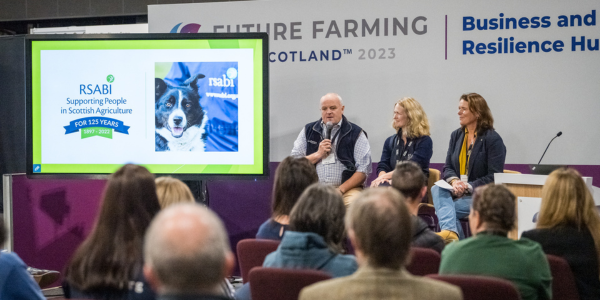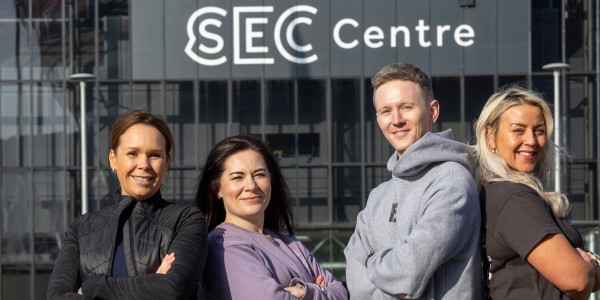
2,000 enthusiastic visitors flocked to witness a groundbreaking showcase of Scottish agricultural innovation over two days at the inaugural Future Farming Expo Scotland.
The free-to-attend trailblazing event, held at Aberdeen’s renowned P&J Live venue on 10 and 11 October, has cemented its place as a firm fixture in the agricultural calendar.
The Future Farming Expo offers a fresh take on traditional agri-events, with a focus on active discussion and practical advice for farmers. Aiming to support Scotland and its farmers towards making Scotland a global leader in innovative, profitable and sustainable agriculture, the new event saw industry leaders offer actionable advice to attendees.
Diverse panels of industry experts shared their insights and expertise across eight ‘knowledge hubs’ covering a wide variety of topics, which included:
Arable:
• A packed session saw Berwickshire farmer Neil White speak to Emma Penny about his experience overhauling his system to focus on regenerative farming.
• Adam Christie, Scottish Agronomy, spoke about making the most of field trials and research on your farm.
• Clive Blacker, Aganalyst, evaluated how farmers can measure their nitrogen use efficiency.
• Charlie Birnie, Grainco, talked to the prospects for arable markets in times of turmoil.
Business and Personal Resilience:
• Carol McLaren, RSABI, and John Scott ,Farmstrong Scotland, discussed the ways people could boost their personal resilience and help others. Chaired by Heather Wildman, Saviour Associates, John commented that the session was ‘breaking barriers’, with farmers’ mental health unlikely to be discussed even as recently as a couple of years ago.
• Mark Irvine and Michael Urquhart from Police Scotland spoke about how farmers can help guard themselves against rural crime.
• A debate led by the SAYFC’s John McCulloch heard from Ian Davidson OBE, Scottish Land Matching Service, Georgia Donald, Royal Bank of Scotland, and Kirsty Williams, SAC Consulting. They discussed what can be done to help new farming entrants in regards to land sharing.
• Jane Craigie of Jane Craigie Marketing spoke about the opportunities and pitfalls of getting involved with farming’s PR.
• Robert Young, EQ Accountants, explained how farmers can make the most of what their accountant can offer.
Carbon and Soils:
• Independent farm adviser Niels Corfield spoke about how you can weatherproof your farm, and move towards a profitable, subsidy-free operation.
• Lyn White, Scottish Forestry, and Fife farmer Roger Howison discussed agroforestry and what grants and support are available for Scottish farmers.
• Rachel Ramsey, Agrecalc, led a popular session on harnessing the power of agtech to reduce emissions on farms.
• Dr Harry Kamilaris, Agricarbon, explored the essential role of soil carbon as an asset to farm businesses.
• Liz Bowles of Farm Carbon Toolkit tackled the key issues facing farmers in baselining their farm’s carbon footprint.
Livestock:
• Peter Cook, Opportunity North East (ONE) talked about what is holding back profits and expansion in the livestock sector.
• Jonny Mackey, MSD Animal Health, looked at the science behind farming healthy animals.
• Stuart Ashworth, Quality Meat Scotland, discussed the challenges facing the livestock sector for the next 5-10 years.
• Jonathan Birnie, Birnie Consultancy, spoke about what customers and retailers will be seeking in future and how it will shape livestock businesses.
• Tim Geraghty, SRUC Veterinary Services, looked at current and potential future risks to livestock health, and how you can protect your stock against them.
Renewables and Energy:
• Aberdeenshire farmer Fraser Mackintosh chaired a session with farmer Hugh Gordon and Dr Elaine Booth, discussing next steps for those who have had renewables on farm for several years.
• Green hydrogen and its potential for farming and rural businesses was the focus for a discussion between Alex Gauntt, Water to Water, Alison Hester, James Hutton Institute, and Niamh Carr, HydroGlen, who talked about how the James Hutton Institute is developing its HydroGlen project.
• Viktoria Wahle, Burnett & Reid, talked about how you can manage your new renewable energy project.
• Steven Hamilton, Ember Energy, explained how farmers can assess which renewable energy option is the best one for them.
Diversification:
• Farmer/blogger Nicola Wordie (livestock_farmher) interviewed Cammy Wilson (The Sheep Game), about what it means to be a social media influencer – with 200 people watching on Cammy’s livestream from around the world
• Ailbhe Palmer, Sykes Holiday Cottages, offered advice for farmers thinking about diversifying into the world of holiday lets
• John Riddett, Easy Crypto Hunter, spoke about how farmers can take advantage of crypto currency
• Farmers Harry & Helen Brown discussed the possibilities, practicalities, and pros and cons of farm diversification with Alistair Fell of Iron & Pine.
Horticulture and Vertical Farming:
• Nathan Critchlow-Watton, SEPA, discussed how farmers can deal with the rising threat of drought in Scotland, stating that by 2050 we’ll be experiencing drought every two years.
• SAOS’s Jim Booth led a session on how farmers can take advantage of data, discussing an SAOS project which saw a group of potato farmers use data to successfully make decisions.
• Mark Horler and Dr Johnny Stormonth-Darling from UKUET introduced controlled environment agriculture (CEA) as a way for farmers to trade uncertainty for reliability.
• Nigel Jenney, Fresh Produce Consortium, talked about what can be expected for potatoes and horticulture crops in the next few years.
Robotics and Technology:
• Nicola Wordie (livestock_farmher) took part in another popular session explaining how she uses technology on farm and social media to tell her story.
• Aberdeenshire farmer Daniel Robertson shared his experience in using digital technology to boost productivity and profits.
• Ross Robertson, Agri-EPI, spoke about how farmers can take advantage of new robotics and tech and how it could impact your farm business.
• Dr Fernando Auat Cheein, National Robotarium, covered the recent developments in agricultural machinery for orchard management and how machine learning tools are changing the industry’s perspective.
• Peter Robinson, Agxeed, talked about Agxeed’s journey and the future of digital agriculture and the opportunities it creates.
An exciting Demo Zone showcased the cutting-edge technology and agricultural techniques that are shaping the future of farming. Demonstrations included the Agxeed Agbot, a fully autonomous tractor, the James Hutton Institute’s Tom V4 Autunomous Per Plant Mapping, which autonomously scans fields to build a detailed picture of crop status, Pear Technology’s Digital Mapping Technology, and the Farm Carbon Tooklit’s Farm Carbon Calculator.
Over 50 organisations exhibited, including Scottish Government, MSD Animal Health, Sykes Holiday Cottage, The James Hutton Institute, SRUC and SAC Consulting.
Visitors included Emma Burns from the BBC’s This Farming Life programme, who was on the lookout for new farmers and content to feature on the show.
The event was driven by research conducted with farmers across Scotland to ensure it provided exactly what they were looking for – an event where they could talk to people in depth, hear from people who have already implemented new ideas and technology on their farm, learn about the pros and cons of these, and how they can put them into practice in their own businesses.
The Future Farming Expo also played host to the Future Energy Integrations Conference, joining forces with two influential organisations, UK Urban AgriTech (UKUAT) and FarmTech Society, to co-locate the conference. Alongside this, farmers also heard from Scottish Government agriculturalists to find out what they can do to prepare for changing agricultural support and have their say on the Agricultural Reform Programme.
Farmer and speaker at the event, Neil White, said:
“The Expo had a relaxed atmosphere with plenty to see, but maybe more importantly, listen to in the various hubs around the hall. In each hub there were discussions and questions from farmers on the floor.
“Knowledge transfer farmer-to-farmer has been an underrated resource until now. Shows like this are encouraging a discussion to take place and maybe a take home message or two, as well as free gifts, and in that venue it definitely has potential to grow. It was a pleasure to be part of it.”
John Scott, Chair of Farmstrong Scotland, also spoke at the event. He added:
“I attended with three of our young team including my oldest, James, who is 22. We found the second day especially interesting with some excellent speakers which appealed to us as livestock producers.
“The event wasn’t for tyre kickers which really suited us, and we were able to have multiple high level business focused conversations over the two days. It’s an event that we would certainly attend again.”
Cheryl Waterman, Event Producer, Future Farming Expo, said:
“We are delighted that 2,000 visitors joined us for the first ever Future Farming Expo Scotland. The two days have been an exhilarating blend of knowledge sharing and connection for the Scottish farming community.
“In a rapidly evolving agricultural landscape, innovation is key and that is exactly what the Expo offered! I hope our attendees have left energised and inspired to make positive changes in their farm businesses, while playing a valued role in transforming the future of Scottish farming.”
Please keep an eye on the Future Farming Expo website for future announcements: futurefarmingexpo.com




